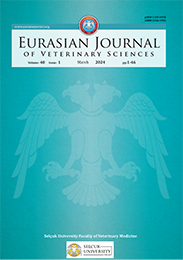| 1993, Cilt 9, Sayı 2, Sayfa(lar) 053-056 |
| [ Türkçe Özet ] [ PDF ] |
| A Study On The Causes And The ir Treatment Results Of The Dystocia in cows Observed Between 1985- 1992 Years In Elazığ Region |
| Cahit Kalkan1, Hüseyin Deveci2, A. Mükremin Apaydın3, Halis Öcal1, Hüseyin Timurkan4, Hayrettin Çetin5, Erdal Kaygusuzoğlu5 |
| 1Yrd. Doç. Dr., F.Ü. Vet. Fak., Doğum ve Üreme Hast. A.B.D., Elazığ 2Prof. Dr., F.Ü. Vet. Fak., Doğum ve Üreme Hast. AB.D., Elazığ 3Doç. Dr., F.Ü. Vet. Fak., Doğum ve Üreme Hast. A.B.D., Elazığ 4Yrd. Doç. Dr., Y.Y.Ü. Vet. Fak., Doğum ve Üreme Hast. A.B.D., Van 5Arş. Gör., F.Ü. Vet. Fak., Doğum ve Üreme Hast. A.B.D., Elazığ |
| Downloaded:1843 - Viewed: 2462 |
|
In this study, the causes, treatment
methods and results obtained after treatment of the
dystocia observed between 1985- 1992 years in Elazığ
region were investigated. In the study, 195 cows and
heifers aged 2-10 years were use d as material. These animals were treated aither in the Clinic of Obstetrics and Gynecology Faculty of Veterinary Medicine, Fırat University or in the places where the animals are held.
It has been understood that these dystocia resulted from fet al and matem al causes in the rations of 72.68 % and 27.32 %, respectively. The fetal causes were anormal postures with 30.63 % and relative or absolut growth with 18.82 %. The main one of the maternal causes was uterine inertia w ith 10.33 %. The calvas included 72.4 % ma/e and 27.6 % female. These fetuses were found to enter into the pelvic canal 74.17% anteriorly, 21.85 % posteriorly and 3.9 % transversally The mortality ratio of the calvas due to the dystocia was 27.6 %. 94.87% of the fetuses treated within the first 10 hours and 48. 72% of the ones treated from 10 hours were delivered alive. |
| [ Türkçe Özet ] [ PDF ] |




